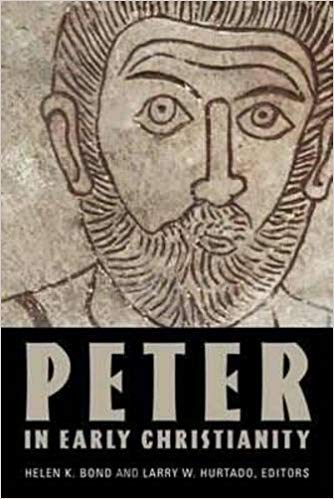The next essay in the volume Peter in Early Christianity is by another old and now departed friend Sean Freyne of Dublin. Freyne’s charge was to deal with the archaeological work at what was probably Peter’s home town, namely Bethsaida, and he does not shy away from the controversy as to whether Bethsaida Julia dug by Rami Arav and company is the right site, or if another one further around the lake is the correct locale. He favors Bethsaida Julia. In any case, these sites were not in Antipas’ territory but rather in the territory of Herod Philip first and then Herod Agrippa II thereafter. This is of some importance because the evidence shows that like at Caesarea Philippi where there was a temple to Augustus, Philip had allowed a temple to Julia, the wife of Augustus to be built there and he even minted a coin that portrayed Julia as the goddess Ceres, the goddess of plenty! In other words, Peter grew up in a very Hellenized area, and there is a possibility that Simon from an early age knew some Greek as well as Aramaic. Freyne reviews the evidence that shows the locals were involved in the fishing industry, and as the ‘Fisherman’s house’ shows, could prosper in this profession if it was done with diligence and care. Freyne suggests it may have been the taxes, or the pagan influences that helped prompt Peter to leave his day job and follow Jesus and his Jewish renewal movement. Perhaps that was part of it.
Margaret Williams contributes the third essay on the nomenclature issue as it involves Simon/Peter. She is right that Cephas, like Boanerges, is a nickname, not a proper name, though eventually it became a proper name when translated into Greek as Petros. As she also points out, nicknames are inside names, for those in the know. She is also right that his proper name Simon bar Jonah, indicates his family cherished the Maccabean heritage and retaking of Jerusalem. She points out that the evidence suggests there is a close relationship between a personal name and one’s religio-political stance (p. 33). She’s right about that. “Until Simon Maccabee comes to dominate the scene in the third quarter of the second century BCE, the patriarchal name Shimon hardly ever occurs in the Palestinian Jewish onamasticon, a fact that is not surprising considering the less-than-glorious part played by that particular son of Jacob in the Biblical narrative.” (p. 32). Indeed, the evidence shows that there were six Hasmonean names for which about a third of Jewish boys in Peter’s day were named– Matthew, Judah, John, Jonathan,Eleazar, and Simon. This may help explain the resorting to some nicknames to distinguish those with the same proper names. But in Simon’s case, it is Jesus who gives him his nickname. Actually, this whole line of discussion may shed some significant light on Peter’s own political inclinations. He may have seen Jesus’ entry into Jerusalem and cleansing of the temple as a sign Jesus was prepared to take political action, and take over in Jerusalem. This in turn may explain his use of the sword on Malchus to prevent the capture of Jesus. Just a thought. Perhaps Peter was not merely mercurial, perhaps he was also a closet zealot.
For the record, the name Petros, as well as the name Cephas, is not unprecedented, the former found in pagan contexts in Egypt in the first century, but also at Masada, the latter name Cephas is rarer, but attested in Egypt as early as the 5th century B.C. (p. 40). Williams also suggests Peter lived in Jerusalem for some time after Easter, and could have improved his Greek at that juncture. Greek was certainly one of the main languages spoken there in the first century. She suggests that some (perhaps the Hellenists) called Simon by the name Petros whilst living there. Helpfully, Williams also points out that when Peter finally went to Rome, there would be good reason for any Christian to use their Greek or Latin names, namely that after Claudius’s banishing of Jewish Christians from Rome in the 40s, it would be helpful to use a name that did not draw attention to one’s Jewishness (p. 45).













